Introduction
Deciding to sell a business is a choice that holds weight for both the seller and the buyer in shaping their futures ahead. Whether its due to retirement goals or the aspiration for opportunities or financial obligations necessitating the move; grasping the complexities of this journey is vital for a smooth and fruitful transaction. This piece explores the stages involved in selling a business. From assessing its present situation and reasons for sale, to closing the agreement and steering clear of typical challenges along the way.
Drawing on the wisdom of professionals, in the field and offering tips and guidance this manual is designed to empower entrepreneurs with the information and tactics necessary to successfully manage the intricacies of selling a business all while securing a seamless and lucrative handover.
Step 1: Evaluate Your Business and Reasons for Selling
Before you begin offering your products or services to customers or clients, carefully consider why you are choosing to sell the company; Are you contemplating retirement soon, initiating a new venture, or facing financial challenges that necessitate selling the company for financial reasons? To effectively plan your selling strategy. Have a clear idea of what to expect from the transaction process; understanding your reasons for selling is essential. In addition, to this step reflecting on your motivations think about where your venture stands; what are its strengths and weaknesses? By assessing the condition of your enterprise this will assist you in recognizing areas that require enhancement before offering it for purchase.
When thinking about selling your company to someone for the right price point is crucial in making informed decisions swiftly amid the complexities and costs of an M&A deal as Doug Bend from Bend Law Group advises on it's significance. Nanxi Liu, from Blaze. Tech also emphasizes the significance of having an understanding of whether your venture is meant to maintain its current state as a lifestyle operation or geared towards expansion or eventual sale on shaping your sales approach.
In addition to that point I made earlier on having a thought out departure strategy is extremely important. This strategy needs to detail the schedule of events and the roles and standards for everyone included such as staff members suppliers and clients. Failing to devise an exit plan could result in disorder disagreements. A decrease, in worth. Guaranteeing a transfer of ownership and keeping key staff members on board can greatly impact the outcome of the transaction.
Evaluating the Quality of Earnings (referred to as QOE) can provide insights to prospective purchasers and investors by delivering a comprehensive assessment of your company's financial health. It aids in comprehending the stability and possible risks associated with the earnings produced by guaranteeing their consistency and durability.
Finally be cautious of companies who might show interest in buying your business just to gather information without actually intending to buy it A strong mutual non disclosure agreement is vital before divulging any confidential details Listen, to your gut feelings and safeguard your company important information
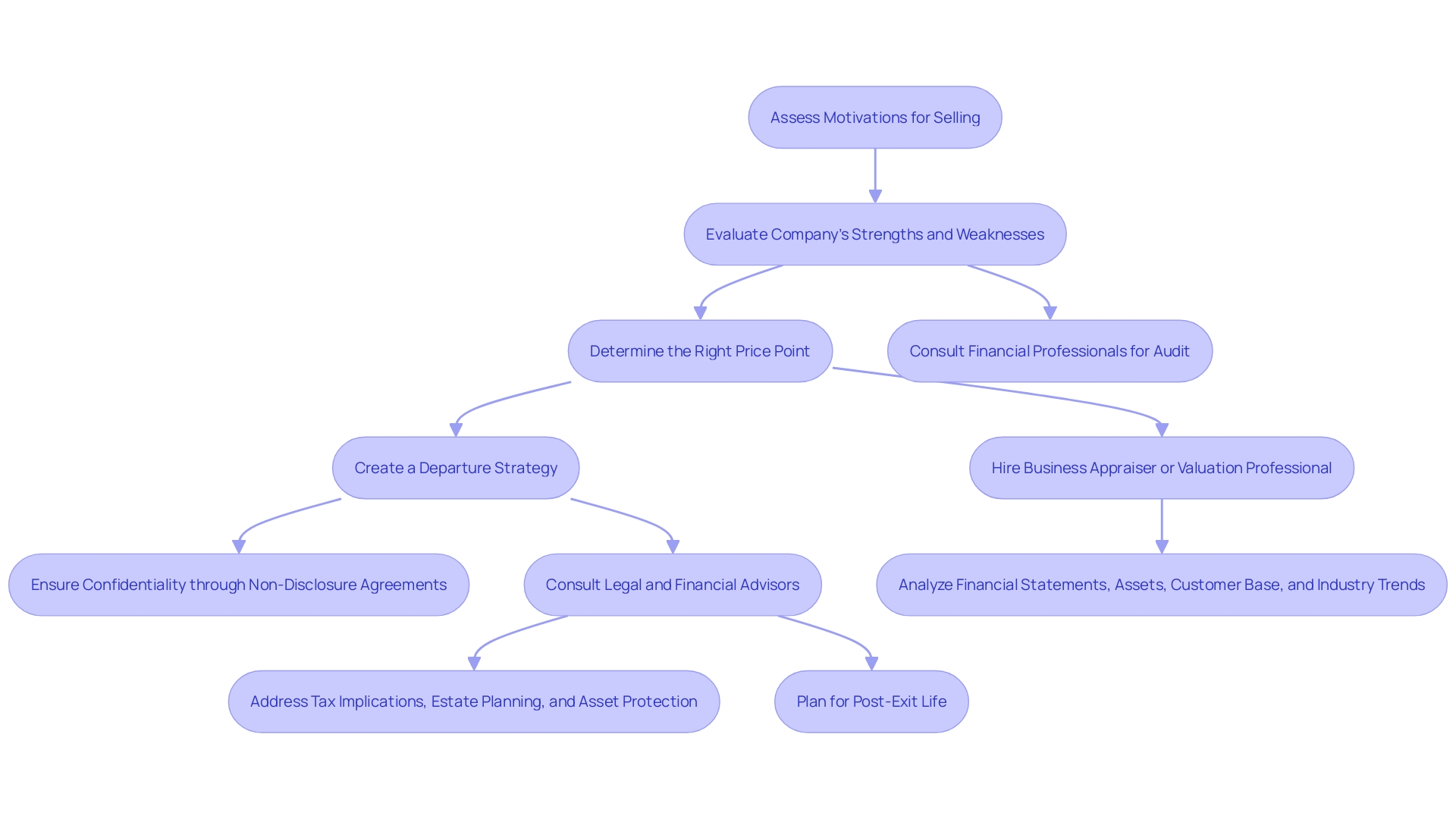
Step 2: Prepare Your Business for Sale
In order to draw in interested buyers effectively portray your business in its light by starting with a comprehensive assessment to grasp its actual value and avoid the pitfalls of over or underestimation Operational enhancements like improving customer service and simplifying procedures can greatly enhance attractiveness and worth As advised by Doug Bend from Bend Law Group PC establishing a precise price objective is crucial, in deciding whether to move forward with the selling process In a discussion by Nanxi Liu of Blaze. Tech the significance of determining the purpose behind your business. Whether it is intended for growth potential or for sale or simply, as a lifestyle venture. Was underscored strongly. It was suggested that addressing any lingering problems and enhancing the image of your enterprise can not only attract potential buyers but also result in a higher selling price being commanded. It may be advantageous to commit to incorporating these strategies into your operational approach and reap the rewards that follow.
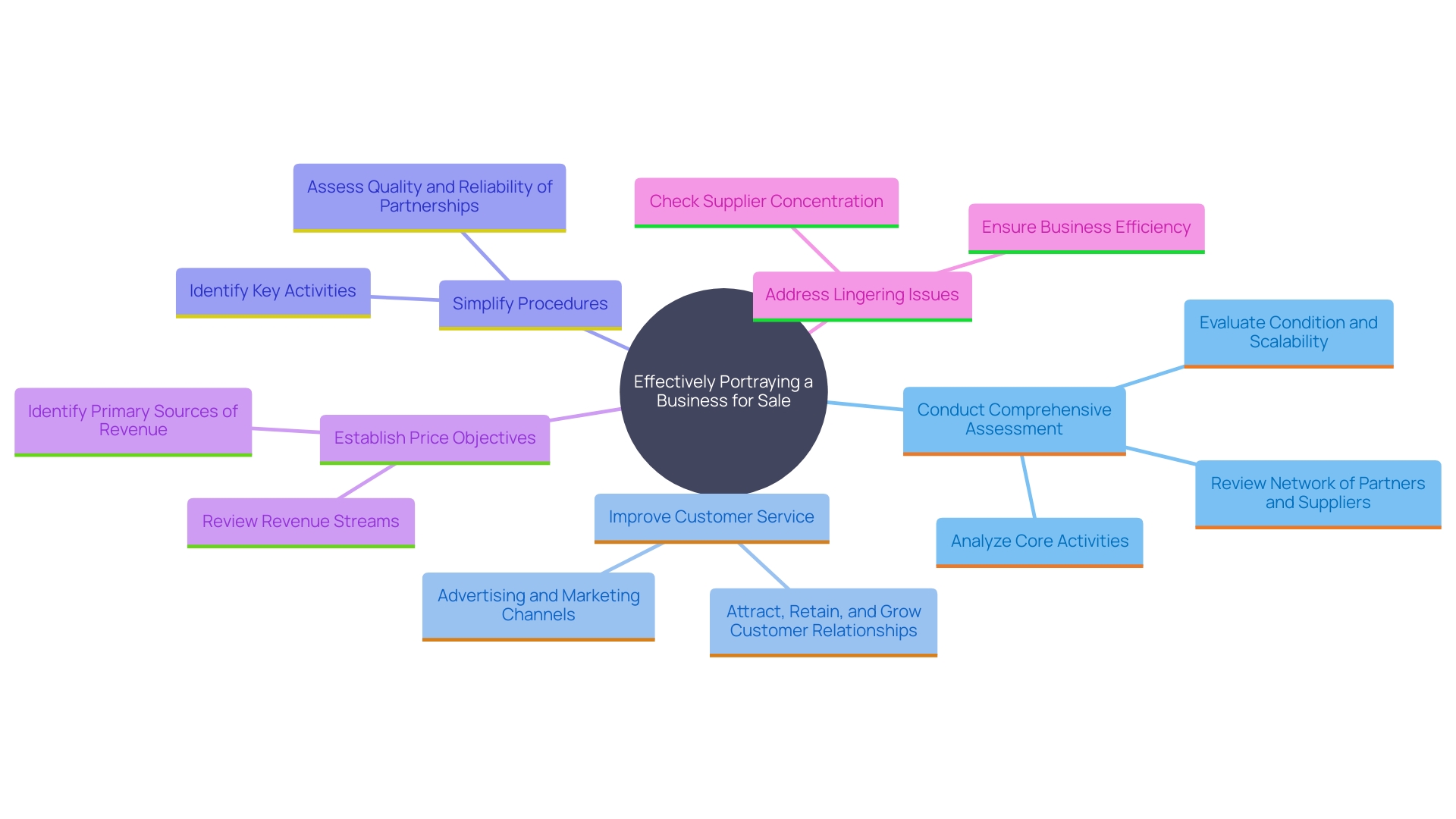
Step 3: Determine the Value of Your Business
Determining the worth of your enterprise is crucial when it comes to deciding the appropriate selling price and ensuring a smooth sale process. The valuation process entails figuring out the value of your company and there are various approaches to take into account. You can opt to engage an appraiser or employ valuation methods like the income approach, making comparisons with market data and assessing assets for their value. Every method has its benefits. Is suitable for various phases of organizational growth. One example is the income method which assesses a company's ability to produce profits. Appropriate for enterprises with stable revenue streams already established. On the hand market comparisons involve assessing your enterprise against similar ones that have recently been sold, giving a value perspective based on market activity. Asset based valuations focus on both intangible assets of an organization providing a comprehensive understanding of its true value.
Knowing the value of your business is essential for setting prices and improving your negotiation position according to experts in the field who say "Come with me as we delve into these methods and offer perspectives to make the valuation process easier and help stakeholders determine a companys real worth with precision." This holistic valuation method prepares you to present an argument to prospective buyers which can result in a more seamless and lucrative sale, in the end.
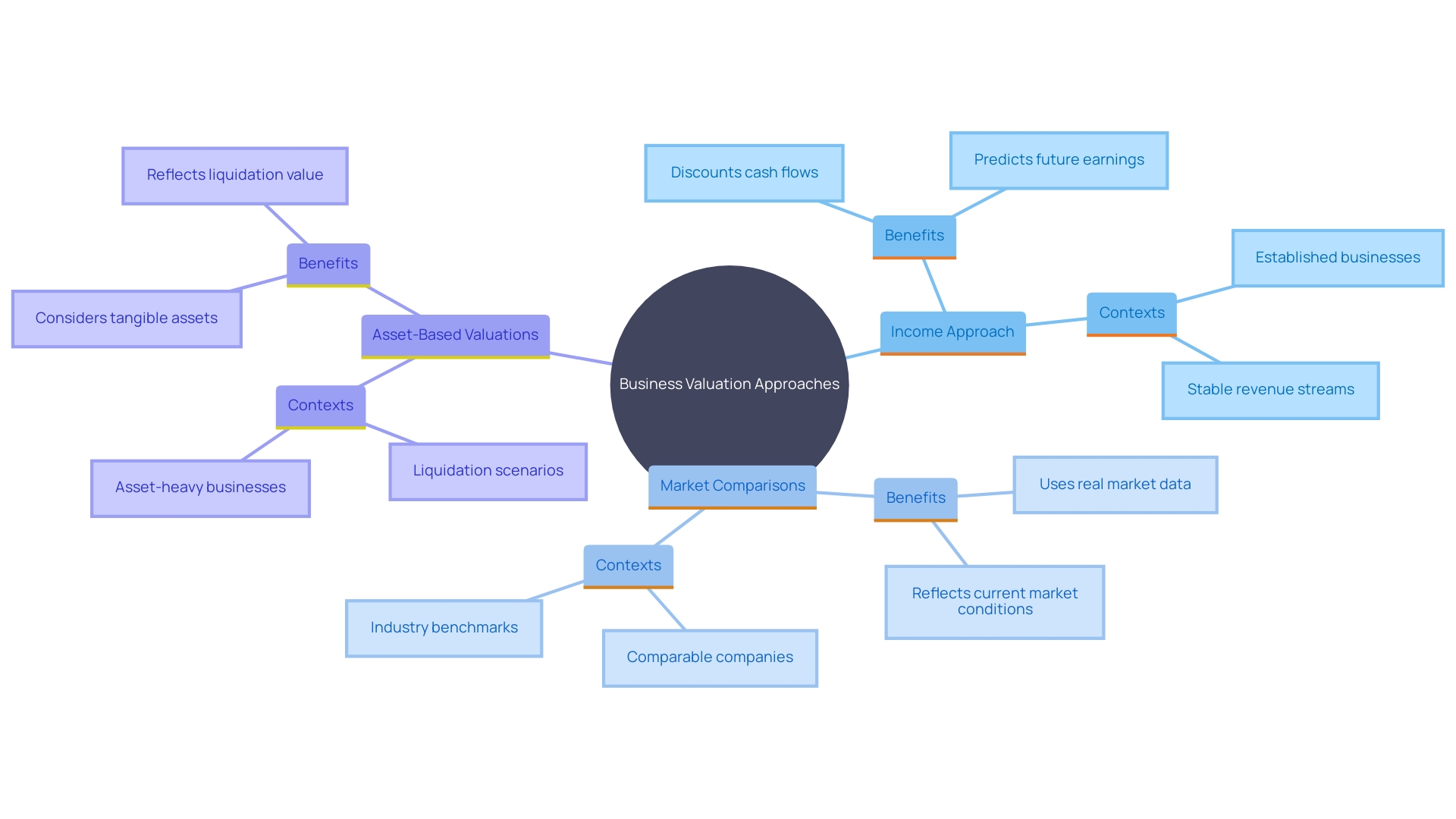
Step 4: Gather Essential Financial Documents
Potential buyers will thoroughly review your documents to evaluate the robustness of your company's economic standing. To aid in this evaluation it's important to have maintained and current paperwork like tax filings, income statements, balance sheets and cash flow reports, from recent years. These records aren't figures; they narrate the tale of your business fiscal well being and reliability. Transparent monetary records build confidence. Can notably hasten the transaction procedure. During a discussion about managing money in a meeting I attended recently emphasized the significance of interpreting and communicating statements accurately during negotiations for your success or failure in deals. Specialists emphasized the significance of possessing monetary records and future forecasts when navigating the complex realm of commerce transactions to guarantee a smooth transition from one stage to another. In reality. Organized financial management methods have proven to boost the likelihood of closing deals by as much, as 20% illustrating how crucial it is to have thorough financial planning in place.
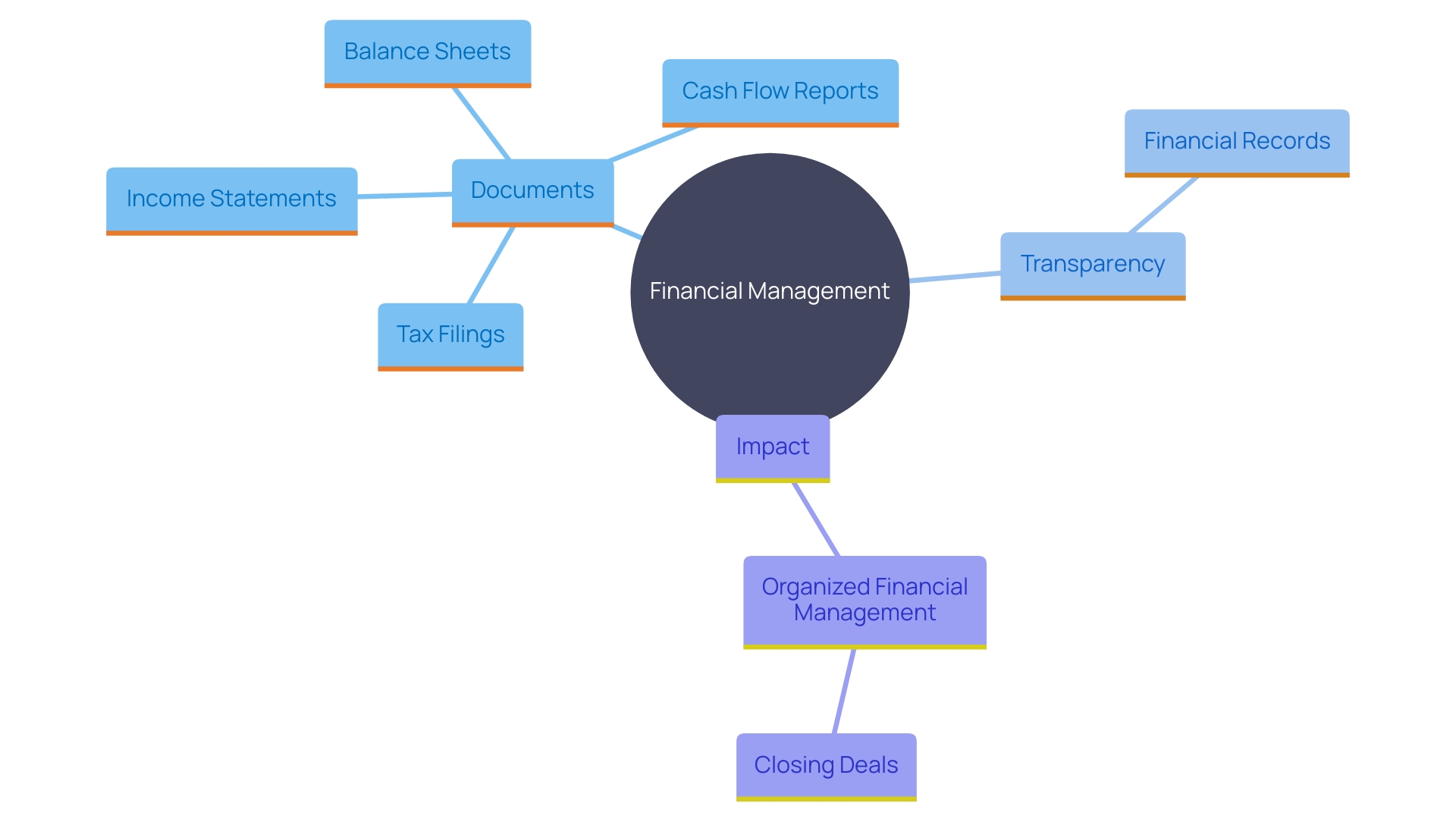
Step 5: Market Your Business to Potential Buyers
Crafting a marketing plan is crucial for attracting the ideal customers to your venture. Consider utilizing marketing resources such as search engine optimization (SEO) and social media promotions to connect with a wider range of potential clients and adjust swiftly to shifts in the market landscape. Remaining attentive to customer demands and prevailing trends within your industry will help maintain the relevance and attractiveness of your enterprise. Introducing ideas in your products, services, and operations can further boost the appeal of your organization. Collaborating with neighboring enterprises can lead to shared advantages and heightened visibility within the community.
It's crucial to develop a proposal that highlights your organization's strengths and growth possibilities in the market efficiently and informatively to distinguish itself as a valuable investment choice for potential investors seeking stability and growth opportunities based on a recent Fiserv study demonstrating the resilience and positive outlook of small enterprises across the nation for the upcoming year.
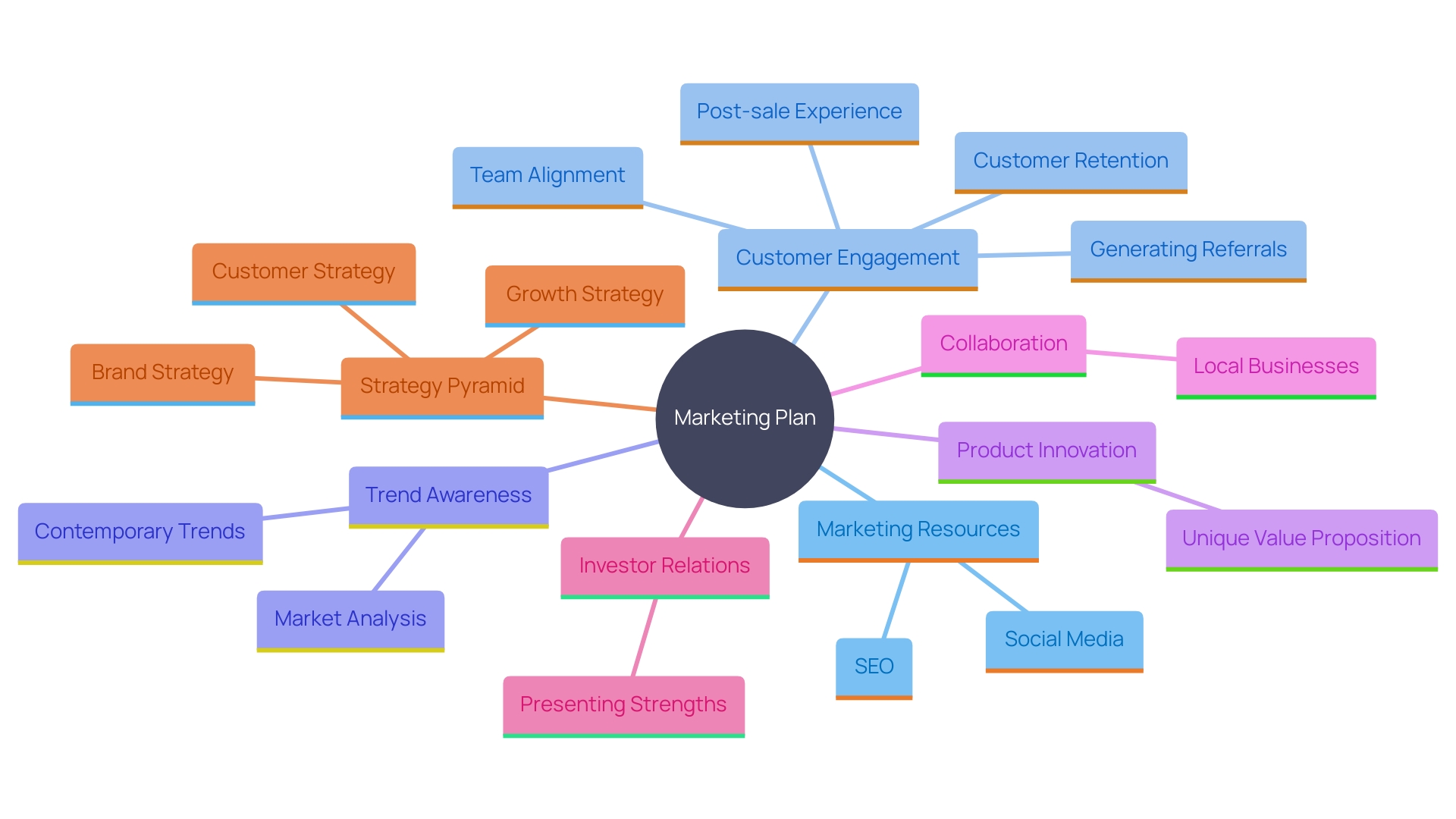
Step 6: Screen and Qualify Potential Buyers
When transferring ownership to the purchaser, it's not solely about the amount they propose; it's essential to carefully evaluate possible purchasers by examining their financial dependability and sector experience, as well as their commitment to preserving your enterprise's legacy. This approach allows you to draw in authentic candidates who possess the capability to complete the transaction successfully and continue the success of your venture.
Buyers frequently have to grasp the sellers priorities beyond the price tag and empathy is key in this scenario. Doug Bend, from Bend Law Group emphasizes the importance of a mutual non disclosure agreement as competitors may feign interest to gather intel without any real intent to seal the deal.
In discussions with Nanxi Liu of Blaze. Tech it's crucial to have a price goal in mind before deciding on whether to move forward with the possibly costly and time intensive M&A deal process. The National Center for the Middle Market discovered that most middle market owners involved in selling or merging lack prior M&A experience – underscoring the importance of open dialogue and transparency to help potential investors grasp the company's assets and drawbacks.
Financial investors often utilize management team rollovers as a strategy to maintain the commitment of executives to the business's success following a transaction closure. This practice entails managers swapping some of their ownership in the company for shares in the acquiring entity to ensure shared goals and boost the company's value post deal. It is vital for all stakeholders to grasp the nuances and impact of rollover arrangements.
To safeguard the reputation of your company and pave the way for a transition process, with greater chances of success. It's essential to thoroughly evaluate potential clients before making any decisions.
Step 7: Negotiate the Terms of Sale
When you find buyers for your product or service and start discussing the deal details with them. Like the price you're looking for and how you'd like to get paid. It's important to lay out your expectations clearly from the beginning. Doug Bend from Bend Law Group stresses that having an idea of your target price can help you make quick decisions about moving forward with the sometimes lengthy merger and acquisition process. Remember that a successful negotiation is about finding a solution that works for everyone involved; be ready to give a while also standing firm on whats most important, to you.
Keep calm when emotions are intense; it's important not to be manipulated in someone Scheme. Make sure to research and verify information to identify any possible risks. An earn out agreement can ensure interests by mandating that the seller achieves certain performance targets before receiving the full price. Flexibility is crucial as negotiations often deviate from the plan. Ami Kassar emphasizes the significance of self management and the need to have in depth understanding of your product well as your customers and market dynamics, in his book 'The Growth Dilemma.'
Successful negotiations can result in increased customer loyalty. Repeat opportunities by showcasing the value you offer to your clients while also generating lucrative deals that protect your profit margins. Maintaining long term relationships with customers is an indicator of effective negotiations, alongside a shorter sales cycle and elevated customer satisfaction levels. Employing feedback and surveys to evaluate these outcomes will assist in determining if your negotiation strategies are positively influencing your overall success.
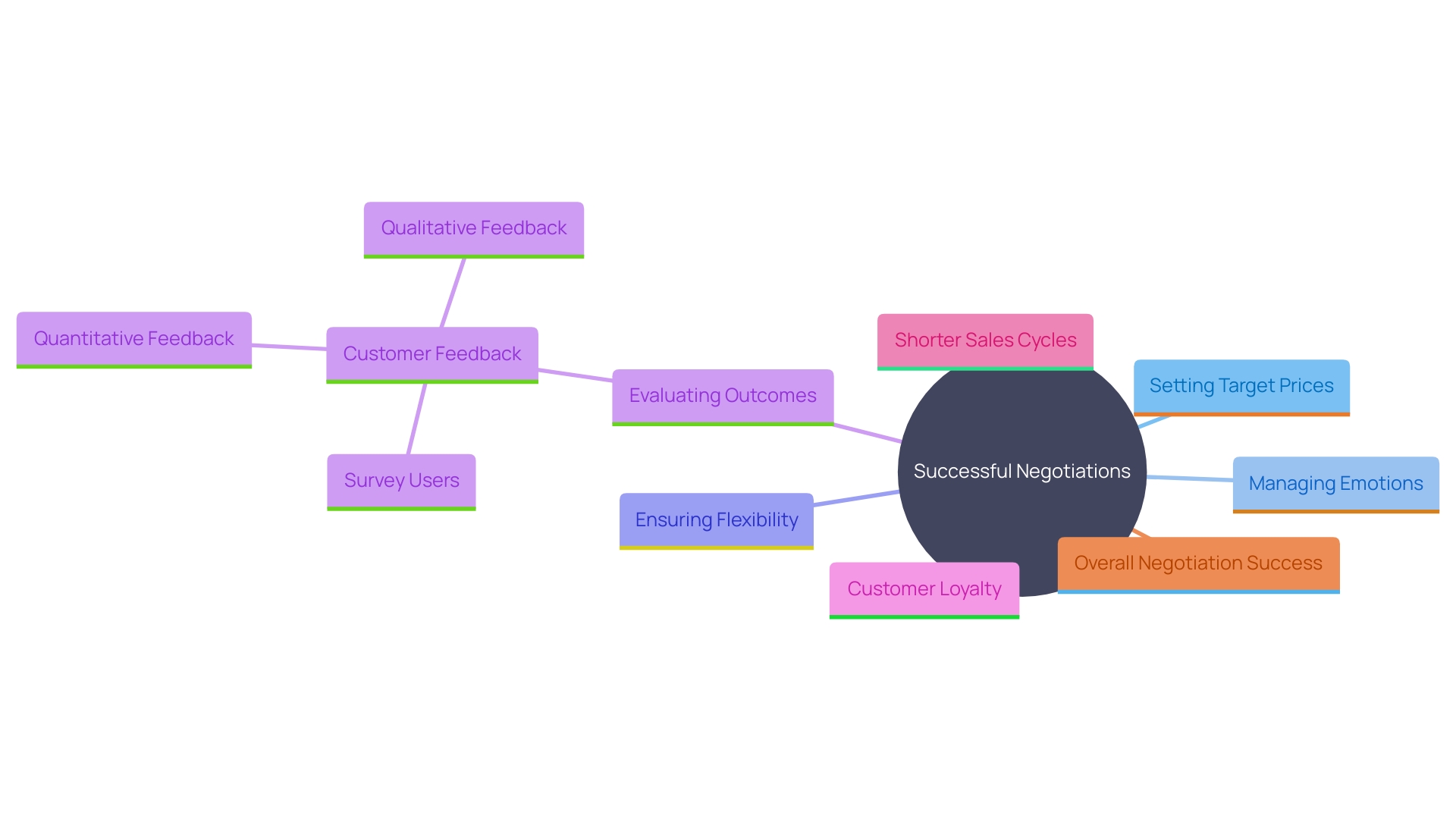
Step 8: Conduct Due Diligence
When a possible purchaser expresses interest in your venture and wishes to learn more about it through thorough investigation procedures like confirming its details meticulously, it is vital to emphasize openness at this stage. Ensure you have all the necessary documents easily accessible and be prepared to answer questions. During the investigation phase, a detailed assessment of your enterprise's past and current performance, market position, and future growth potential will be carried out.
Christian Atzler from Baker McKenzies M&A team highlights the need to involve all parties. Including joint venture collaborators and staff, with purchase privileges. From the outset to prevent potential obstacles and build trust early on in the discussions. Moreover Doug Bend of Bend Law Group suggests establishing a mutual non disclosure agreement to safeguard your sensitive data throughout this phase.
When conducting a due diligence assessment its important to look into the trends of revenue generation and earnings as well as key valuation metrics such as earnings per share (EPS) and price to earnings (P/E). It's also vital to analyze the industry landscape and competitive environment to get a view of where your enterprise fits in the market scene. This meticulous examination assists the buyer in making informed choices and instills trust in the transaction process.
Step 9: Close the Deal and Finalize the Sale
Finalizing the sale of your enterprise is a stage that demands careful scrutiny to the finest details involved in the process. Work closely with legal and financial experts to guarantee that all agreements are meticulously prepared and well organized. Prior to putting pen to paper for approval purposes carefully scrutinize each clause to steer of any unexpected issues. It is crucial for both parties involved to stay true, to their obligations throughout the finalization phase.
Competitors could pretend to be interested just to gather information than actually intending to make a purchase. To safeguard your enterprise effectively and ensure confidentiality of information it's essential to secure a strong mutual non-disclosure agreement prior to sharing any confidential details. Always trust your instincts. Refrain from disclosing too much information too quickly.
It's essential to obtain a company appraisal since ignoring this factor could lead to selling your enterprise for less than its true worth or establishing a price that may deter possible purchasers. Seeking guidance from an appraiser can offer a balanced market value as a valuable point of reference, in deal negotiations.
Comprehensive investigation is essential for a deal in commercial activities; a vendor must organize all relevant documentation in advance, such as revenue reports, tax submissions, and employee agreements. It's crucial to tackle any issues early to establish confidence with possible purchasers and ensure the transaction process proceeds more efficiently.
Keep in mind that letters of intent are quite affordable nowadays—especially when you're using platforms like Acquire! They provide information regarding the reasons for a sale that can genuinely influence your decision-making process greatly! By addressing all aspects involved in the process you'll be able to make a seamless and confident shift into the next phase.
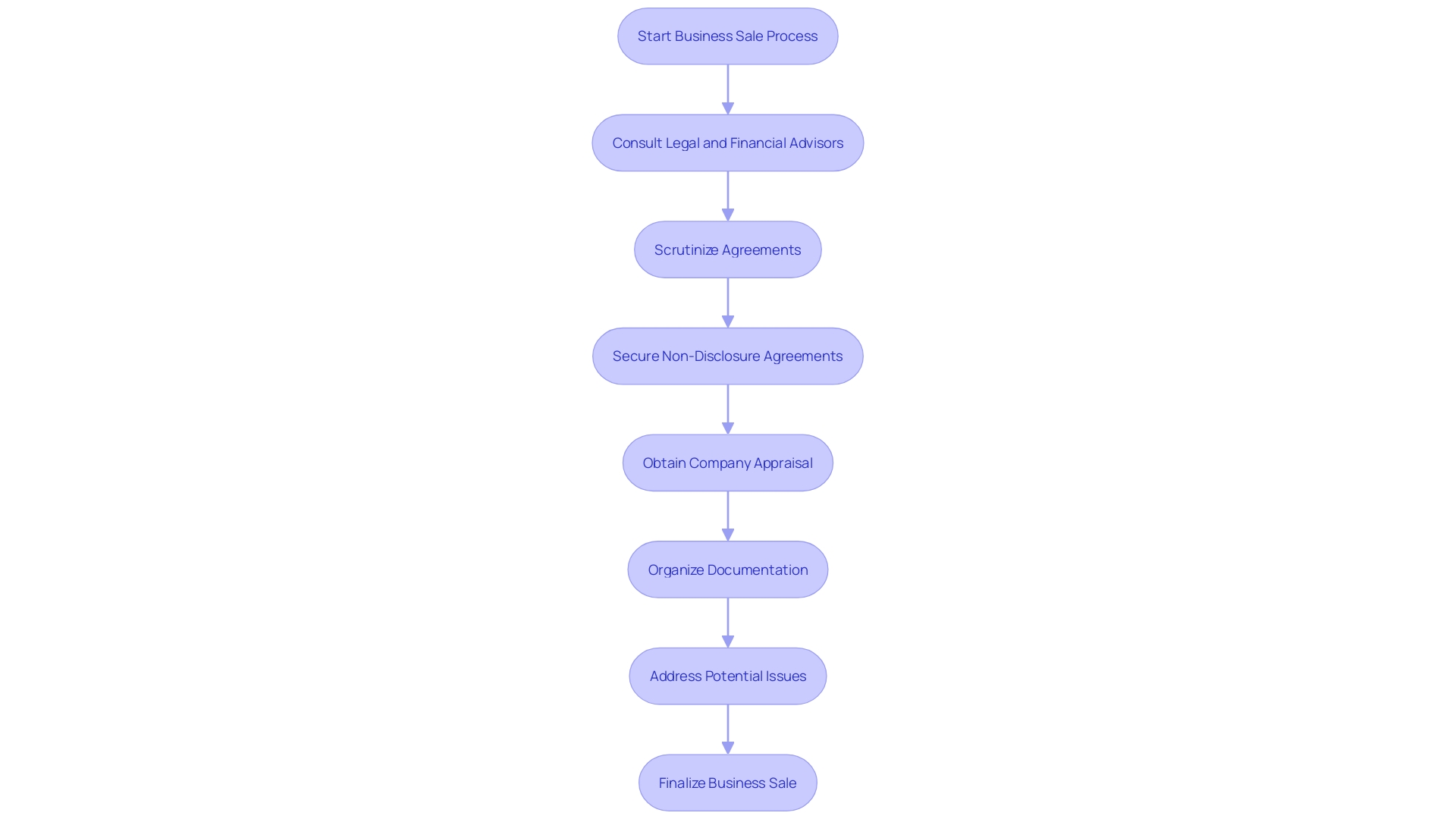
Common Mistakes to Avoid When Selling Independently
When you decide to sell your business on your own of using a broker or agent can be satisfying but risky if not done right to secure a good deal successfully Avoid the common mistakes by starting with a detailed valuation of your business that is accurate and thorough Overpricing from neglect can scare off buyers while underpricing leads to financial setbacks Hiring an expert, in business appraisal can assist in establishing the appropriate market value by looking at financial records assets and current industry patterns
It is also important to establish a price goal in mind when considering a merger and acquisition ( M&A ) deal as noted by Nanxi Liu, from Blaze.tech. Having a price target can assist in determining whether it is worthwhile to move forward with the detailed and time consuming process of completing an M&A transaction.
Before disclosing any information to potential purchasers make sure to establish a firm mutual non disclosure agreement ( NDA ). According to Doug Bend of Bend Law Group PC it is crucial to safeguard your company's selling point from competitors who may show interest solely to gather information without any genuine interest, in buying.
It's important to have a thought out exit strategy in place too. This strategy needs to detail the schedule and roles for everyone affected like staff members and suppliers as well as client expectations. A seamless transition is key to avoiding confusion and disagreements while preserving the organization's worth.
Remember that it's important to do your homework from both sides of the equation when looking into buyers. Ensure they possess the financial resources and experience required for your enterprise and that their goals are in harmony with yours. Givelle Lamano of Oakland DUI Attorneys suggests considering how much you plan to be involved after the transaction as this can influence where the enterprise goes from here on out.
Concentrating on these aspects will enhance the chances of a successful and fulfilling transaction of your enterprise.
Legal Considerations and Professional Assistance
When selling a company and dealing with matters can be complex and overwhelming at times. It's crucial to involve professionals such as lawyers and accountants who focus on transactions. They can offer guidance regarding mandates and guarantee that all contractual responsibilities are fulfilled to protect your interests during the selling process. Brian Quinn, from Boston College points out that Massachusetts law sees ownership of closely held enterprises as a 'partnership,' which adds more complexity to the situation. Additionally, the Legal Trends Report highlights the significance of understanding complexities based on information collected from various legal specialists, indicating that obtaining suitable legal counsel can significantly improve the outcomes of transactions. As Lesonsky advises, "When operating an enterprise, certain disagreements and conflicts are unavoidable. There are strategies that I recommend using to settle your disputes effectively; ensure all matters are documented."."This proactive strategy can save time. Reduce stress enabling a more seamless transition, for the sale of your business.
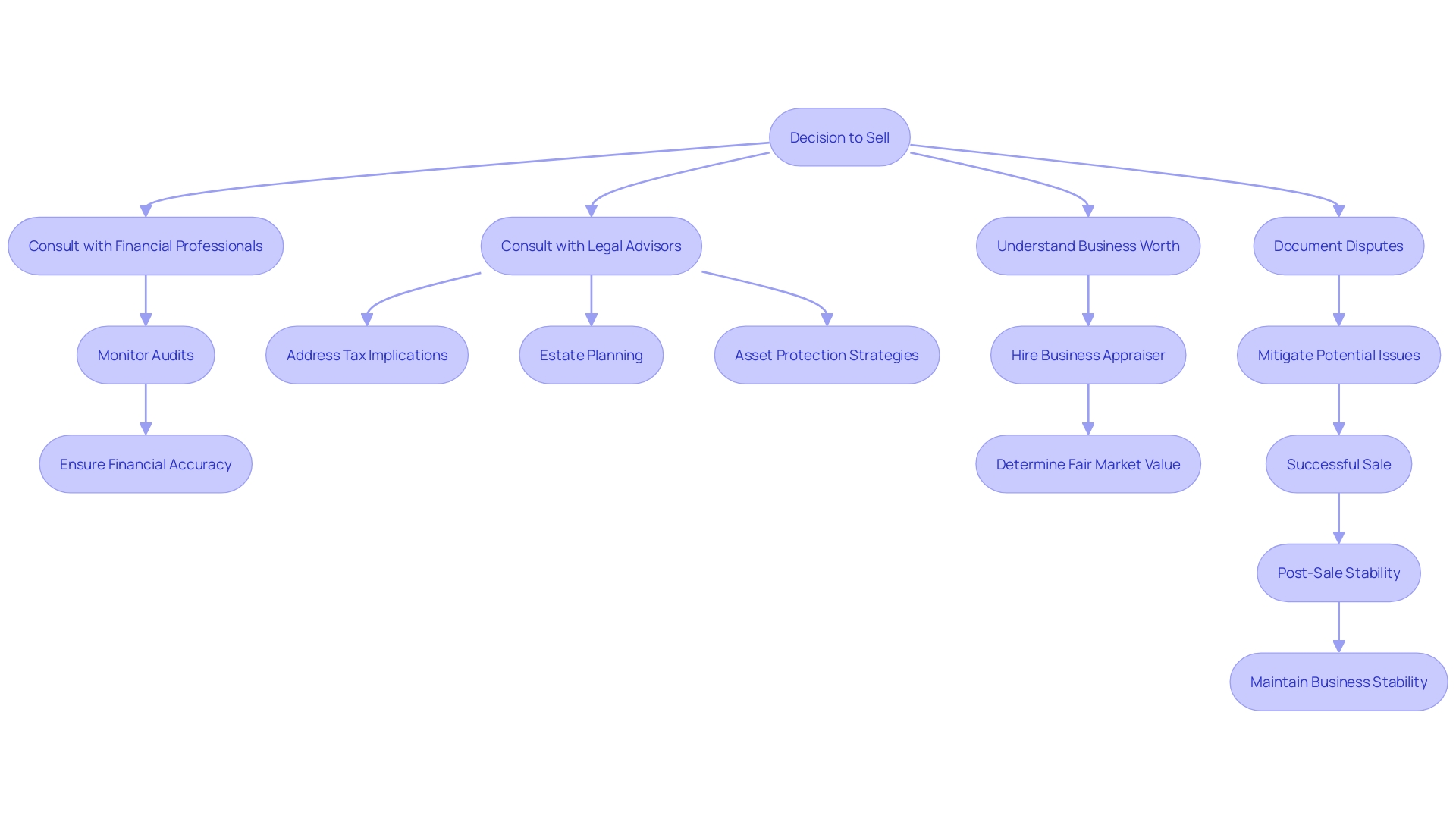
Conclusion
Starting the process of selling a business involves planning and precise execution as it is a complex endeavor that demands attention to various aspects and considerations at every step of the way. The initial phase commences with an assessment of the business itself and delving into the reasons driving the decision to sell it off. Gaining insights into the condition of the business is crucial; this involves identifying its areas of excellence as well, as its shortcomings in order to establish a well defined plan and facilitate a smooth transition process.
Effective preparation is key to drawing in buyers as it enhances operational effectiveness and clearly communicates the value proposition to increase attractiveness, to buyers significantly. Moreover discussing business valuation is essential as it guides pricing strategies and bolsters negotiation positions effectively.
Keeping your records in order helps build trust and speeds up sales transactions; at the same time using smart marketing approaches ensures that your business connects with the right customers.
Ensuring research is crucial and cannot be emphasized enough in business transactions. Maintaining openness and honesty throughout this process establishes trust. Gives potential buyers confidence, in the companys sustainability. Finalizing the agreement demands scrutiny of every aspect to guarantee that all legal and financial matters are appropriately managed.
Steering clear of mistakes, like setting prices too high or not thoroughly vetting potential buyers can protect the sellers concerns and result in a better overall result.
Collaborating with financial experts at every stage boosts the chances of a deal going through smoothly and successfully. Their knowledge is crucial in navigating the intricacies of a sale and ensuring that everyone involved is well informed and in agreement. By following these guidelines sellers are able to set off with confidence towards their goals paving the path for a transition and exciting new prospects, down the road.




